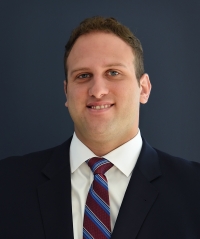News & Events
Bill Antheil, Sue Maslow & Bill MacMinn enjoyed a commemorative cake with the firm on March 1st to mark 25 Years since the firm's establishment.
Antheil Maslow & MacMinn is pleased to announce that Partner Jessica Pritchard has been elected to serve as Vice President/President Elect of the Bucks County Bar Association. The Bucks County Bar Association, one of the oldest and most active bar associations in the United States, has over 800 members and is dedicated to providing support and fellowship for the advancement of the legal profession. Ms. Pritchard has been an active member of the Association and has served in a variety of leadership roles, including as Board Secretary, Board member, as well as chair of the Family Law Section.
Jessica Pritchard chairs the firm’s family law department. Her practice focuses exclusively in the area of family law, where she handles all phases of the negotiation and litigation of domestic relations cases, including divorce, child custody, child support, alimony/spousal support, equitable distribution, and prenuptial and postnuptial agreements.
Celebrating over 25 years in business, Antheil Maslow & MacMinn, LLP is a full-service law firm that offers sophisticated, proactive, timely and cost-effective legal advice. The Firm has a broad range of practice areas in Business & Finance; Family Law, Death & Serious Injury; Estates & Trusts; Health Care; Labor & Employment; Litigation; Nonprofits; Real Estate & Land Use; Tax; and Bankruptcy. The Firm works with high net worth individuals, small to mid-sized, privately-held companies, nonprofits and health care organizations in the Greater Philadelphia and New Jersey areas. Antheil Maslow & MacMinn, LLP is headquartered in Doylestown, Pennsylvania with a branch office in Princeton, New Jersey.
By Patricia Collins, Esquire
Employers have been working to comply with new overtime rules issued by the United States Department of Labor that raise the salary level in order to meet certain exemptions from overtime rules before a December 1, 2016 deadline. Those rules require that in addition to meeting certain requirements with regard to an employee’s duties, the employee must also earn a minimum salary of $47,476. The old rule required that the employee earn a minimum salary of $23,660. The dramatic increase in the salary requirement caused employers to reevaluate classifications and to generate new policies regarding overtime and work hours.
On November 22, 2016, the United States District Court for the Eastern District of Texas issued a preliminary injunction, temporarily barring the Department of Labor from enforcing the new overtime rule. The order will remain in place pending a full hearing on the issue. While the order is temporary, as a prerequisite to entering the order, the Court was required to find that there was a substantial likelihood of success on the merits of the argument that the DOL exceeded its authority in promulgating the rule. So, there is some indication that the Court may bar enforcement of the new rules permanently.
For now, employers are temporarily relieved of the obligation to comply with the new rules by the December 1, 2016 deadline. Because the outcome is not guaranteed, employers should have their new policies ready to go, but do not need to implement them on December 1. It is simply too early to say whether employers should “shelve” those new policies. We will have to wait for the Court’s final ruling. Stay tuned to this space as the case unfolds.
Patricia Collins is an employment and litigation Partner at Antheil Maslow & MacMinn, LLP and chair of the labor and employment practice group.
On November 17th, Patricia Collins, Esquire, a Partner with Antheil Maslow & MacMinn, LLP in Doylestown, will participate as an instructor at McCloskey Partners’ Crash Course - HR BOOTCAMP held from 9:00 AM – 3:00 PM at Stay Bridge Suites in Montgomeryville. The program covers areas including: FLSA requirements, recruiting and hiring, managing within the law, the importance of the HR audit, documenting, disciplining, delegating and termination of employees, Workers Compensation, the importance of the HR Audit, communication / conflict resolution, benefits basics, social media policies, and many other important topics for employers.
Heather McCloskey will moderate this training event designed specifically for small-to-medium sized companies. In attendance will be business owners, professionals who handle HR as one of their varied responsibilities, entry-level HR employees and managers that in addition to their other tasks handle HR as well.
Participants may register by contacting denise@mccloskeypartners.com or 215-716-3035 x 700.
Patty Collins, a Partner with Antheil, Maslow & MacMinn, will be joined by Cindy Bergvall, CPA, of Bee, Bergvall & Co. for a panel discussion on new Department of Labor overtime regulations and their impact on employers. This informative breakfast seminar is hosted by The Catalyst Center for Nonprofit Management on October 7th at Aldie Mansion in Doylestown. There is no charge for this event, but registration is required.
These new regulations will require action from almost every for-profit and not-for-profit organization with employees earning less than $47, 476 per year. Participants will learn about the changes in the law and what organizations will need to do when the law goes into effect on December 1, 2016.
Antheil Maslow & MacMinn is very pleased to announce that a new Associate, Gabriel Montemuro, is joining our Litigation and Real Estate and Land Use practice groups. Gabe’s practice focuses on litigation, including commercial litigation, personal injury, estate and employment law. He represents clients regarding business disputes such as contract and employment issues, real estate litigation and fraud claims. Gabe also works with clients to provide assistance with land use and zoning issues such as land development approvals, variances, special exceptions and conditional use approvals. He represents parties in real estate purchases and sales, including agreements of sale, where he guides clients through the process to complete all obligations, responsibilities and contingencies to the agreement and provides oversight during the closing process.
Firm Partners Tom Donnelly and Jessica Pritchard attended Heritage Conservancy's Farm to Table Event at Manoff Market Gardens in New Hope on Saturday, August 6, 2016. Antheil Maslow & MacMinn was proud to be a sponsor of this event. Guests enjoyed a gourmet meal using farm-fresh and locally sourced ingredients. Manoff Market Gardens is an active farm that is situated on a 35 plus acre Heritage Conservancy owned and preserved property. This event highlights the importance of protecting our region's farmland.
You are invited to join us:
When: Sunday, September 11th: 12:30 – 3:00.
What: Antheil Maslow & MacMinn's Annual Client Appreciation BBQ.
Where: AMM's Doylestown Office, 131 West State St. Doylestown.
We hope you’ll join us for some great food and refreshments and enjoy a fun afternoon in the heart of Doylestown! This event includes a BBQ lunch and a front row seat to the Doylestown Arts Festival and Bike Race.
All of our clients and friends are welcome.
Jessica Pritchard will be honored by the YWCA Bucks County as a 2016 "Women Who Make a Difference" Awardee at the organization's 25th Annual Awards Celebration on May 12th. Ms. Pritchard is being recognized for her many personal, professional and volunteer activities which improve the lives of others and make Bucks County a great place to live.
Ms. Pritchard is an active member of several professional and charitable organizations. She previously served as the assistant solicitor for the Bucks County Department of Mental Health and Developmental Programs and as a member of the Bucks County Mental Health and Developmental Programs Advisory Board. As the mother of a child with special needs, Ms. Pritchard has an interest in the local human services community. She is also a former member of the Board of Directors at the Lenape Valley Foundation.
As a member of the Board of Directors of the Bucks County Bar Association, Ms. Pritchard serves as Secretary of the Association as well as chair of the Family Law Section. Ms. Pritchard provides pro bono family law services to disadvantaged members of the local community.
Ms. Pritchard represents military veterans free of charge through the Pennsylvania Bar Association's Lawyers Saluting veterans Program, which is coordinated through the Pro Bono Office and military Veterans' Affairs Committee. She serves as a member of the Board of Directors of the Duskin Stephens Foundation, which benefits the families of fallen veterans of Special Operations Forces.
We are pleased to announce the addition of Lisa J. Gaier to the Firm’s Family Law and Estates and Trusts practice groups. As a Domestic Relations practitioner, Ms. Gaier handles a variety of issues, including divorce, child support, alimony/spousal support, equitable distribution and child custody matters. As part of the Estates and Trusts group, she is involved with estate planning including the drafting of Wills, Trusts, Powers of Attorney, and Living Wills, as well as assisting with estate administration and Orphans’ Court matters, with a particular emphasis on guardianships.









